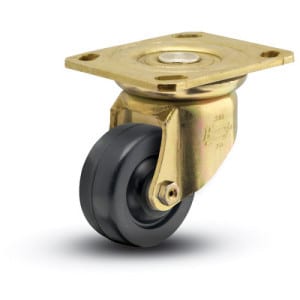 With the many different styles and designs of casters, there is no one answer to the question of how long casters will last. But if treated properly, the life of many casters is quite long. Think of the casters on grand pianos in concert halls. These casters last many years without replacement if they are properly cared for.
With the many different styles and designs of casters, there is no one answer to the question of how long casters will last. But if treated properly, the life of many casters is quite long. Think of the casters on grand pianos in concert halls. These casters last many years without replacement if they are properly cared for.
This is the key, proper care and preventive maintenance will greatly prolong caster life, while misuse and mistreatment can lead to premature failure. Here are a few things to keep in mind to ensure longevity for your casters.
Know Your Maximum Capacity and Don’t Exceed It
One of the biggest mistakes people make is in overloading their casters. What some people don’t realize is that there are such a wide variety of caster load limits that it is easy to find one that will suit your needs. Choosing the right number of casters that have the right total load capacity for your needs will help ensure that the casters last through the life of your cart.
Don’t Overstress the Performance of Your Caster
Excess weight is not the only way to over-stress a caster. By putting the caster in conditions it is not designed for, such as excessive speed, you can cause premature and often catastrophic caster failure. Know what your caster can do and choose a caster for the application you need.
Know What Kind of Maintenance Your Casters Require
Depending on the caster you choose, you may have maintenance to perform routine maintenance to keep your caster in good working order. Some casters will require lubrication with a good quality multi-purpose grease suited to the environment and temperatures your casters will see. For casters without sealed in grease, you may need to apply lubricant on a routine basis depending on your environment. In more severe environments or through washing, the grease may need to be applied more often.
Check for Damage or Wear That May Indicate Problems
Periodically checking your caster is a great way to identify problems early before they cause caster failure or irreparable damage. How the caster is attached to the cart can affect the performance and wear, as well as forces that act on the caster during use that can change the initial positioning.
Some things to consider include damaged carts or loose mounting bolts, which can cause the caster mounting to shift out of alignment. Damage also occur when loads are dropped into place. Foreign contaminants can cause wheel damage that prevents rotation or causes uneven wheel wear. Something as simple as a thread wrapped around the wheel can bind it.
Douglas Equipment Knows Casters
We can determine what capacity limits, configuration and materials will give you reliable, long-lasting performance from you casters. Contact our support team today.




